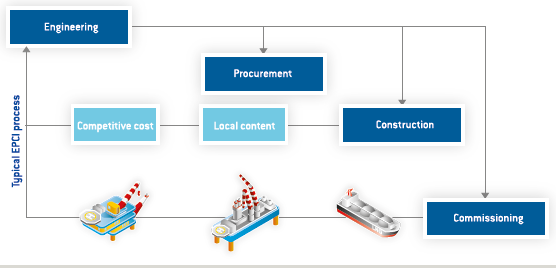Engineering & Construction Offshore
Integrated project management

Saipem is well positioned in the market of large projects for the development of offshore hydrocarbon fields leveraging on its technical and operational skills (supported by a technologically advanced fleet and the ability to operate in complex environments) and engineering and project management capabilities acquired on the marketplace over recent years (such as Bouygues Offshore). Saipem intends to consolidate its market share strengthening its EPIC oriented business model and leveraging on its satisfactory long-term relationships with the major oil companies and National Oil Companies. Higher levels of efficiency and flexibility are expected to be achieved by reaching the technological excellence and the highest economies of scale in its engineering hubs employing local resources in contexts where this represents a competitive advantage, integrating in its own business model the direct management of construction process through the creation of a large construction yard in South-East Asia and revamping/upgrading its construction fleet. Over the next years, Saipem will invest in the new construction yard in Brazil to be completed in 2014, fleet maintenance/substitutions, major upgrades on offshore fleet, equipment for the execution of awarded/expected projects and investments in strategic areas.
In 2013 revenues amounted to €5,094 million, down by 2.2% from 2012, due to lower levels of activity in the North Sea, Kazakhstan and Australia. Orders acquired amounted to €5,777 million (€7,477 million in 2012).
Among the main orders acquired were: (i) an EPCI contract on behalf of Total Upstream Nigeria Ltd, for the development of the Egina field in Nigeria that includes engineering, procurement, fabrication, installation and pre-commissioning of subsea pipelines for oil and gas production and gas export, flexible jumpers and umbilicals; (ii) a contract on behalf of Burullus Gas Company for the development of the West Delta Deep Marine - Phase IXa Project, about 90 kilometers off the Mediterranean coast of Egypt. The project is aimed to the installation of subsea facilities (in water depths up to 850 meters) in the West Delta Deep Marine Concession, where Saipem had already successfully performed some previous phases of subsea field development; (iii) an EPCI contract on behalf of ExxonMobil pertaining to the engineering, procurement, fabrication and installation of subsea pipelines of production and water injection, rigid jumpers and other related subsea structures as part of Kizomba Satellites Phase 2 project, in the Angolan offshore.
In 2013 Saipem continued to pursue the development of state of the art technologies for working in deep and ultra-deep waters, the design of floating liquefaction facilities, the development of new techniques and equipment for the installation and grounding of underwater pipes in extreme conditions. In particular, the innovative “Subsea Processing” system and floating liquefaction units (FLNG) were developed. In the process of subsea pipeline construction, new equipment was applied successfully, which enhanced the process and the quality of steel pipes’ soldering with carbon and stainless materials.
